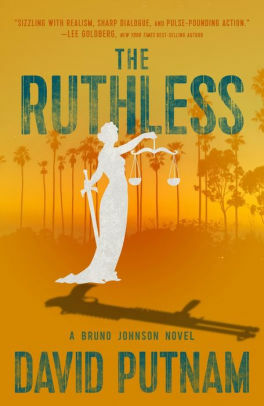
“The Ruthless,” David Putnam’s eighth novel in his Bruno Johnson series, could well have been called “blood and bone” because much of the vicious action (including this very phrase) turns on violence administered by both good guys and bad, even though Los Angeles County Sheriff Deputy Bruno Johnson occasionally expresses remorse.
A big guy with a rep for going after sadistic baddies, Bruno can (with difficulty) restrain his desire for revenge — except in his mind’s eye. He holds off, for example, exacting vengeance on the criminal who murdered his teenage daughter and a grandson, a while back, and on moving now too quickly against the thugs who shot to death his friend, a judge, and his wife.
Ostensibly released from the police force — for legendary bad behavior — Bruno knows he has to play both sides, justice and crime, because his latest and secret assignment involves a high-stakes sting operation run by a sociopathic arms dealer. So, in the world of crime series and beat-up, but ever-courageous flawed protagonists, what else is new?
Bruno, for one. A Black detective created by a white author with a long career in law enforcement, in the LAPD no less, Johnson is at heart a good guy, beloved by his dead daughter’s dog and devoted to his elderly father who stays in a dangerous crime-ridden community, and to a remaining twin grandson in foster care. He’s confident enough to adopt an alias, “Karl Higgins,” as he goes undercover, even though a local thug says he never met a Black man called Karl spelled with a K (turns out Carl Withers was a Black actor in the Rocky movies). What’s more curious is how easily — meaning racially free — Bruno moves around in the LAPD, especially with Wicks, his long-time white ex-partner, an impatient, relentless, quick-on-the- trigger top cop who values Bruno. Only once does Putnam allude to racism when Wicks mocks Bruno’s use of a hair curl product popular in the ’80s, a “racial slur” that, as Bruno notes, “hurt” but was inaccurate, anyway.
With a long and varied career in the police department, Putnam, who earned awards for heroism, shows his creds in creating authentic scenarios and using insider lingo. Indeed, a reader not in on the latest slang gets an education here. To be shot with “pumpkin balls” is particularly gruesome. And how about “plastic vodka”? And sting operations in general? Bruno wonders about getting the trust and friendship of people he will inevitably double cross, stealing away “years of their lives by putting them into concrete boxes with steel bars.” To which his superior answers: “That’s the life we chose, as did they.” As Wicks says, “We’re given the little pewter top hat, a set of dice, and we move around the board according to set rules.”
In an engaging author’s note at the end, Putnam recounts a drug sting when he helped build a huge fake highway sign that said “Narcotics Checkpoint Ahead.” Narcotics checkpoints, he notes, “are strictly illegal in the U.S., but they didn’t put up a checkpoint: “just the sign. Signs aren’t illegal.” Another goody includes the fact that in his 31 years on the force, he was sued 13 times, a bit over average, “but the kind of people I chased, once cornered, did not, as a rule, stop and throw up their hands in surrender.” Given continuing allegations of racial profiling and arrests, it’s all the more curious — and admirable — that Putnam chose to make his series protagonist Black.
Putnam lets on as to how, early in his career, he believed that too many crime novels and movies turned on “overwrought” storylines about hitmen or contract killers until he found out he had family members in the Mafia, killers who did in a favorite uncle and, after years in prison, are now free. He notes that the killing of the judge and his wife in “The Ruthless,” based on real events, “points strongly to a hitman.”
Thriller endings can be a let-down in resolving plot complications, and in “The Ruthless” it’s clear that major information about Bruno’s daughter, mother and father (referenced too often) are being withheld for the next book in the series. Putnam knows what he’s doing — finally. In a humble dedication to his Florida/Amagansett publishers, he admits to a “rocky” start decades ago — “four literary agents and 156 rejections (before I quit counting).” He figured it out with manuscript no. 38, and now he’s on a roll.